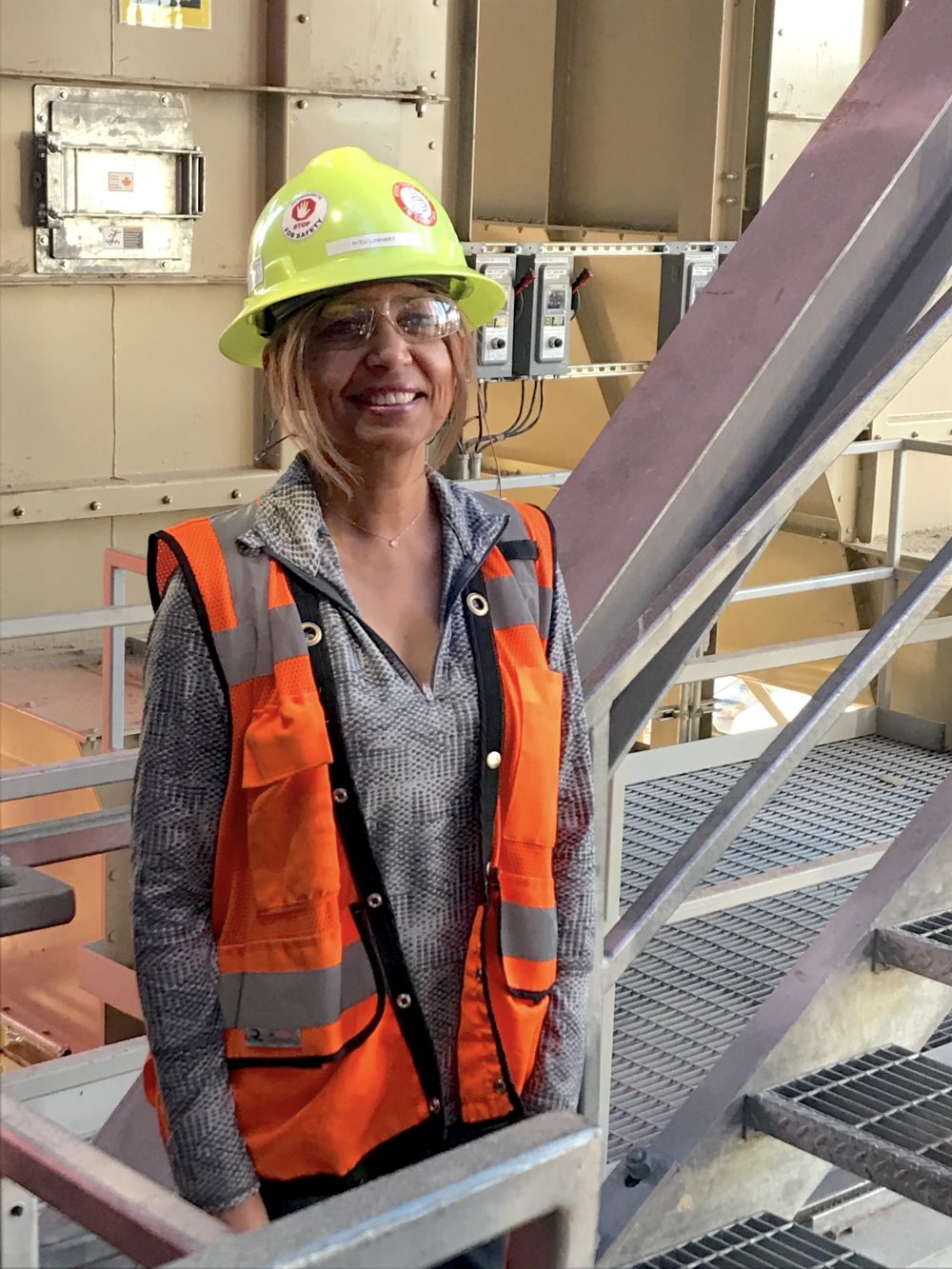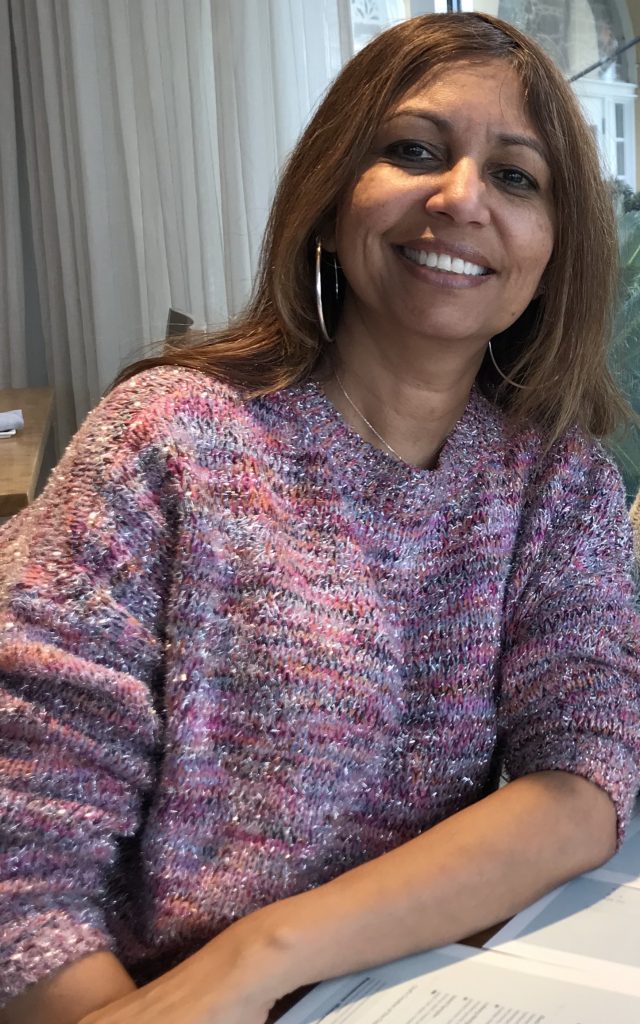
Pellet pioneer: Q&A with pellet plant general manager Ritu Linhart
March 4, 2020
By
Maria Church

Ritu Linhart is the general manager for Pinnacle Renewable Energy’s Aliceville wood pellet plant in Alabama. A process engineer by trade, Linhart had a diverse career in chemical engineering, business, R&D, and academia before turning to the wood pellet industry. After six years in the industry, she was hired on to lead Pinnacle’s U.S. wood pellet plant and is now likely the first woman heading up a pellet operation in North America.
Canadian Biomass: What was your career path that led you to the wood pellet industry?
I got my undergraduate degree in chemical engineering at the University of Florida and then I went to graduate school at Auburn University in 1993. I started out working as a process engineer in the biotechnology sector in fermentation – I helped the company move from the pilot scale to commercial. I have spent most of my career working in renewables and recyclables from the beginning.
After that I worked as an environmental health and safety specialist for all the research facilities at the University of Florida. That is where I got my safety and environmental background. I was responsible for regulatory compliance and did regular inspections to ensure that.
I moved back to Miami, where I’m originally from, after I had my first child. By then I had gotten an executive MBA and thought I’d try out the business field since I needed to be in Miami near family while raising kids. So I worked for a telecommunications company bringing it to market from start-up. I worked there for seven or eight years, after which my son was born in 2002.
Then I moved on to extrusion work. My company made bubble wrap and stretch wrap for commercial purposes like wrapping airplane parts, pallets, or toner cartridges. That position also involved significant recycling work. In-between, I taught as an adjunct professor of chemistry at a local private university and even taught at the high school level for a little while. I would also do research sabbaticals at different universities, conducting nanotechnology and biomedical research and publishing papers. I did all of that as I juggled raising kids.
 In 2012 I got a grant to go to CERN [European Organization for Nuclear Research] in Geneva, Switzerland, for the summer and worked on the God Particle project with the CMS group. Once I got there my mind was blown about what is out there in the universe. That is when I started to venture out and decided to relocate to an area where I could be doing what I really wanted to be doing in life.
In 2012 I got a grant to go to CERN [European Organization for Nuclear Research] in Geneva, Switzerland, for the summer and worked on the God Particle project with the CMS group. Once I got there my mind was blown about what is out there in the universe. That is when I started to venture out and decided to relocate to an area where I could be doing what I really wanted to be doing in life.
I knew I wanted to work in a technical, engineering manufacturing field but I was also passionate about the environment and the need for its sustainability. I didn’t quite know how the two would ever fit together but continued to search actively. As I was looking online at technical positions in sustainability, a position showed up for a process engineer at Georgia Biomass. I got the job and worked there for five and a half years. I left as an operations support manager. The next step was to be a plant manager and that is when I applied at Pinnacle for their first U.S. facility in Aliceville . I got the position as plant manager and started here on Dec. 4, 2018.
CB: What’s involved in the plant manager position?
Gosh, it just involves running the whole show! Running the plant and running the business in the U.S. practically. I have full P&L [profit and loss] responsibility. I manage the employees. I manage quality. I am held accountable for sustainability, shipping, local logistics – the whole nine yards.
It was an easy transition. It’s a similar process at every pellet plant. I felt like I just moved to a different location.
CB: What do you like about the woody biomass industry?
Every day is a challenge. I like that it challenges me. Unlike the chemical industry, there are no hard-fast formulas or recipes for making wood pellets. There are only general guidelines. There are tons of different types of trees that vary by region and impact the overall process, not to mention the seasonal variations in their chemical content that affect the quality and the process significantly. It’s the perfect playground for an individual that thrives on continuous improvement and troubleshooting.
CB: Were there particular people who encouraged you or mentored you?
I want to talk about Mrs. Wallis Tinnie. In college I was a member of the honour society called Phi Theta Kappa, and I was very shy as a teenager. All I did was study – I was basically a nerd you could say. I was not a born leader, but she saw the potential in me. She came up to me one day and said , “I want you to be the next president of PTK.” I looked at her funny. I could barely speak in public – what are you talking about, Mrs. Tinnie! She said, “You are going to learn to do that. You have the potential.” She mentored me and helped me to come out of my shell. Before I left, I was president of that honours society and I spoke at our graduation ceremony in front of an auditorium full of people.
Another woman was about mid-way through my career – Carolyn Vallas. I started teaching high school and doing research in the summers and she ran the research program. She wanted me to join a research group called Research Experience for Teachers. She kept inviting me to conduct research summer after summer for several years. I ended up at the University of Virginia three summers in a row. She pushed me to present papers and she connected me with the biomedical engineering lab. She would fund me through the summers and granted me graduate housing on campus so my kids could go with me. She just made it so much easier for a woman to be successful while raising young children.
I will remember both of them fondly forever!
CB: Do you find there are particular challenges or hurdles for women in our industry?
The wood industry is definitely a man’s world! I don’t know any pellet plant managers who are women. But women are actually perfectly suited because working in the wood industry entails a lot of personal relationship building. A bulk of the fibre contracts to this day are just handshakes. Women have those softer, less obvious social networking skills that help to thrive in this industry.
Throughout my career I would apply for jobs and be one of the final two candidates – myself and a man of course! When they got to me for a second interview, the type of questions I would be asked is, “If the 1,200-horse power ID fan motor is not working, would you know what to do?” I would go through the troubleshooting process as any engineer would, but because I showed up at the interview in my coat and slacks, they could not picture me in my hardhat, my high-vis vest and my steel-toed boots, being out there in the field. It took a lot of explaining to convince them that was my regular attire.
I wish that companies would not judge a book by its cover. They should forget what a candidate looks like and whether they are a man or a woman. Just allow each person an opportunity to succeed without preconceived notions that a woman may not succeed in this industry.
I personally interact with every colleague and business associate as a person and not as a man or a woman and sometimes forget that I am a woman and they are a man, but that honestly allows me to be on an even playing field with everyone else.
Pinnacle took a chance by hiring their first-ever woman GM, plant manager among its 10 different wood pellet manufacturing plants located all over North America and I applaud them for taking a chance on me. They are now the pioneers for promoting women in leadership in this industry and I am hoping that other companies in our industry would follow their lead and do the same.
CB: What advice do you have for women interested in a career in the forest products industry?
My advice to women interested in the forestry and wood pellet industry is to not be hesitant to step out of your comfort zone and take a lead in a male-dominated industry.
It does take effort to go after opportunities like this. I could have just been content in south Florida in extrusion or academia or whatever the next position I landed, which was not in industrial manufacturing like I wanted to be. You have to make a conscious decision to pursue what’s going to make you happy.
And then you have to be willing to make the sacrifices. You have to be willing to do more than the bare minimum. You have to not only be as good as a man, you have to be better than a man in order to stand out.
I can promise you the rewards of personal fulfillment are definitely worth it!
This interview has been edited for length and clarity.
This post is part of CFI, Pulp & Paper Canada and Canadian Biomass’ Women in Forestry project celebrating International Women’s Day on March 8. Find more content here and follow on social media with the hashtag #WomeninForestry, as well as #IWD2020 and #EachforEqual.


